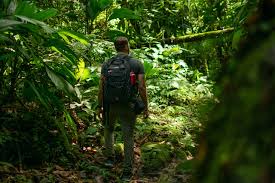News & Events
Ecotourism: Advantages & Disadvantages
- 7 April 2023
- Posted by: admin-rashtielts
- Category: Articles

The article below is taken from getgoodessay.com aiming to help IELTS candidates boost their vocabulary and have enough ideas for them to fully cover any topic in Speaking and Writing. The useful ideas are written in Bold, collocations are shown in red with relevant terms being underlined, followed by their definitions coming along.
Ecotourism: Advantages & Disadvantages
Ecotourism is a form of tourism that mainly focuses on the appreciation and understanding of nature. When eco-tourists go on a trek with the intention to learn about nature, their trips can be transformative experiences by visiting areas where public access is limited. However, eco-tours also have some drawbacks. In this article, we will explore what are the benefits and disadvantages of ecotourism in order to allow you to make realistic decisions as an eco-tourist traveller.
What Is Ecotourism?
Ecotourism is a form of tourism that aims to protect and preserve the environment. It is often associated with eco-friendly activities such as hiking, biking, birdwatching, and wildlife spotting. However, ecotourism can also be destructive if visitors ignore the impact they have on the environment.
Advantages of ecotourism include that it can create jobs and revenue for local communities; it can help conserve natural resources, and it can educate visitors about environmental issues. Disadvantages include that many eco-tourist activities are expensive, and some can be dangerous if done improperly.
Pro & Cons
There are many advantages and disadvantages to ecotourism.
The major advantages of eco-tourism are as follows:
- It helps preserve natural resources.
- It gives people a chance to see wildlife in its natural environment, which can be very different from when the animals are kept in captivity.
- It can improve local economies by providing jobs, income, and education opportunities.
- It helps preserve natural resources through ecotourism activities such as environmental education and sustainable development.
- It promotes international understanding by exposing people to different cultures and lifestyles.
The major disadvantages of eco-tourism are as follows:
- If visitors take too many photos or videos without being respectful of the environment, they can damage habitats and disrupt animal populations.
- Some people may not appreciate the natural environment as much if they have never seen it before.
- Some eco-tourists may damage natural resources or disrupt wildlife habitats.
- Some eco-tourists may behave in an irresponsible or violent manner.
- Some eco-tourists may not comply with local regulations.
Does It Help to Preserve a Culture’s Ecology?
There are many advantages and disadvantages to ecotourism. Some people argue that ecotourism helps preserve a culture’s ecology, as tourists often do not cause extensive damage to the environment while visiting. However, other commentators suggest that ecotourism can actually be detrimental to a culture’s ecology if visitors are not mindful of local customs and traditions.
Conclusion
Ecotourism, or travel that benefits the environment, is becoming increasingly popular. There are many advantages to ecotourism, including reducing the impact on the environment, creating jobs and income for locals, and promoting conservation.
However, there are also some disadvantages to ecotourism that should be considered before embarking on a trip. For example, local communities may not benefit as much from ecotourism as they would have if traditional tourism was the only source of income. Additionally, protected areas may be damaged by tourists who do not take into account the effects of their activities on ecosystems.
ON-TOPIC ITEMS:
Trek: noun [ C ] UK /trek/ US /trek/
a long walk over land such as hills, mountains, or forests
Transformative: adjective UK /trænsˈfɔː.mə.tɪv/ US /trænsˈfɔːr.mə.t̬ɪv/
causing a major change to something or someone, especially in a way that makes it or them better
Preserve: verb UK /prɪˈzɜːv/ US /prɪˈzɝːv/
to keep something as it is, especially in order to prevent it from decaying or being damaged or destroyed
Eco-friendly: adjective UK /ˈiː.kəʊˌfrend.li/ US /ˈiː.koʊˌfrend.li/ US /ˈek.oʊˌfrend.li/
not harmful to the environment, or trying to help the environment
Destructive: adjective UK /dɪˈstrʌk.tɪv/ US /dɪˈstrʌk.tɪv/
causing, or able to cause, damage
Revenue: noun [ U ] UK /ˈrev.ən.juː/ US /ˈrev.ə.nuː/
the income that a government or company receives regularly
Conserve: verb [ T ] UK /kənˈsɜːv/ US /kənˈsɝːv/
to keep and protect something from damage, change, or waste
Habitats: noun [ C or U ] UK /ˈhæb.ɪ.tæt/ US /ˈhæb.ə.tæt/
the natural environment in which an animal or plant usually lives
Comply: verb [ I ] formal UK /kəmˈplaɪ/ US /kəmˈplaɪ/
to act according to an order, set of rules, or request
Regulations: noun [ C or U ] UK /ˌreɡ.jəˈleɪ.ʃən/ US /ˌreɡ.jəˈleɪ.ʃən/
an official rule or the act of controlling something
Ecology: noun [ U ] UK /iˈkɒl.ə.dʒi/ US /iˈkɑː.lə.dʒi/
the relationships between the air, land, water, animals, plants, etc., usually of a particular area, or the scientific study of this
Detrimental: adjective formal UK /ˌdet.rɪˈmen.təl/ US /ˌdet.rəˈmen.t̬əl/
causing harm or damage
Embark: verb [ I ] US /ɪmˈbɑrk/
to go on to a ship or an aircraft
Ecosystems: noun [ C ] UK /ˈiː.kəʊˌsɪs.təm/ US /ˈiː.koʊˌsɪs.təm/ US /ˈe.koʊˌsɪs.təm/
all the living things in an area and the way they affect each other and the environment
Selected and Edited by: Nasibeh Nouri
Javidan Language Centre
www.rashtielts.ir
